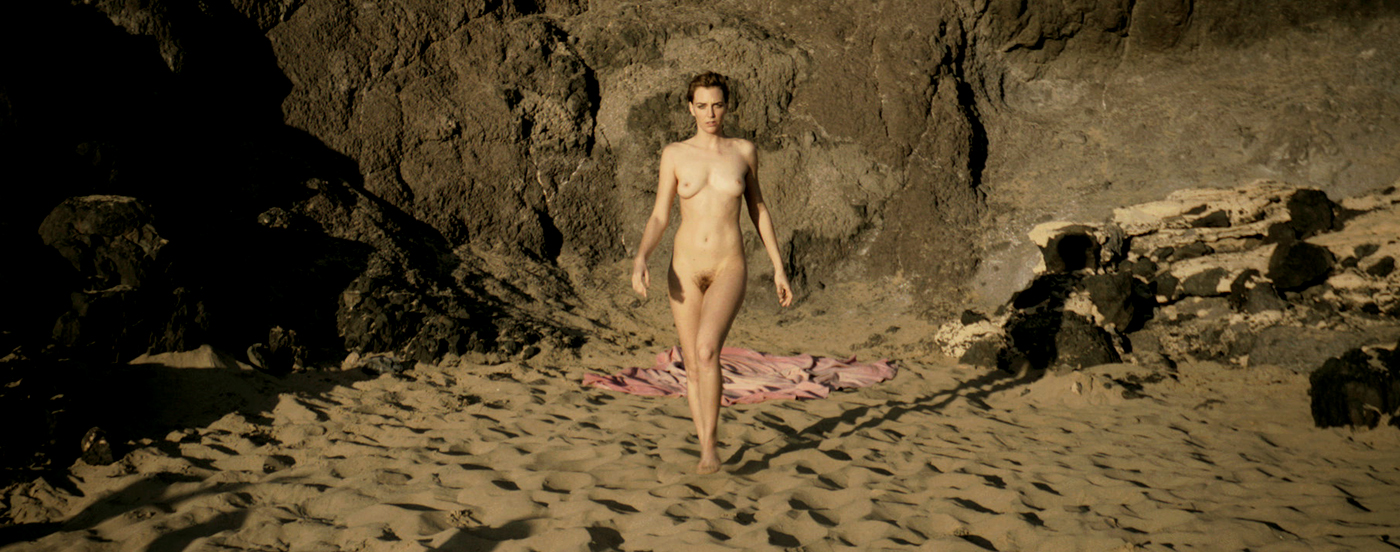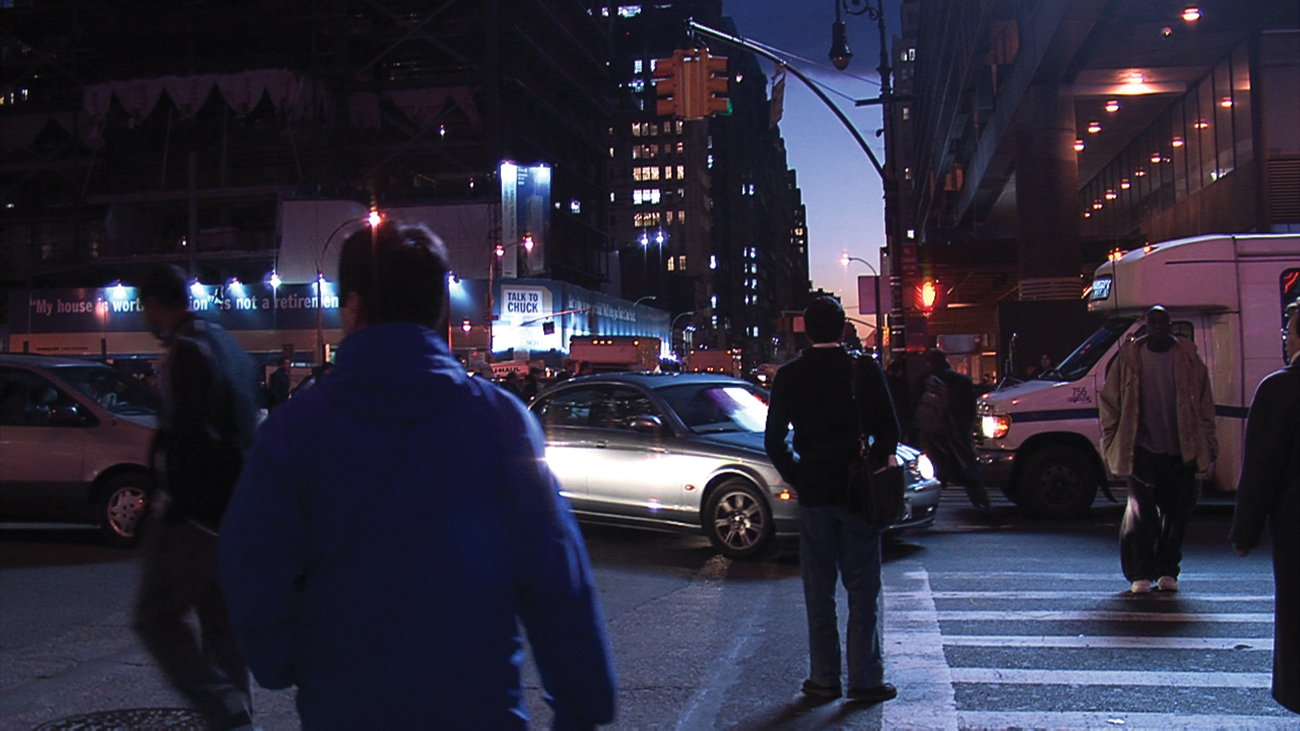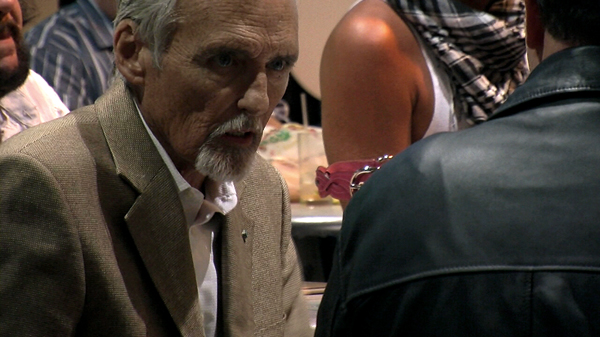Over the past decade artist and filmmaker Nicolas Provost has carefully shaped a portfolio of works that explore the quirks of human expectation by playing with images from film, literature, and popular culture that are ingrained in our collective memory. For Extra Extra, Guggenheim curator David van der Leer speaks with Provost about place, space and the relationships between people in his films and in his personal life. His first feature film The Invader (2011), starring Burkinabe actor Issaka Sawadogo, investigates our expectations of the exotic and the foreigner and is interlaced with sensuality.

Opening scene, The Invader (2011) Courtesy: Versus Production/ Nicolas Provost
In The Divers (2006) Provost resets the parts of our brain programmed with images of romantic balcony scenes. He captures a brilliantly glowing sky – of which the sparkles sadly surpass those of the timid young couple under it. With his urban triptych on New York (Plot Point, 2007), Las Vegas (Stardust, 2010), and Tokyo (Tokyo Giants, 2012), Provost plays with our conditioned anticipation for intrigue that can almost effortlessly be fed by visual and auditory triggers, uncovering beautiful mysteries that hide in the shadows of our everyday lives.
David van der Leer: Many of your works seem to both criticize and celebrate cinematic history. What is so appealing to you about this?
Nicolas Provost: I have a feeling that in cinema we have been telling the same stories for the past hundred years. Especially in the Western world we treat these generic story lines as something close to religion. ‘Here we are: Humans who have to live together. Something happens, so we have to go on a journey together. And hopefully we learn something on that journey. About ourselves, and in the really good stories, not only about ourselves, but also about what’s out there.’ I’m sure we can go on and on with telling these same stories, with the same plot lines, but over the years I got so disappointed with all of this that I stopped watching film for a long time. I got especially tired of stories that spend the last third of the film explaining what happened in the first two thirds and desperately trying to close all the circles so nothing is left for the audience to fill in or chew on.
David: So what do you want to do with film as a filmmaker and artist?
Nicolas: I want to know what it is that makes people dream. Where does that warm feeling inside come from when you watch a film? I want to know if there is something more we can do with image and sound besides telling a story from left to right. What is it that makes one film part of your life, and not the other. I try to see film as a form of fine arts, and I use sound and images to sculpt. I use Hollywood’s storytelling methods and try to make everlasting poetry.
David: You reference the old masters of film a lot in your pieces: how come?
Nicolas: The great masters, like Hitchcock, Kubrick or Lynch, made films like dreams. They can be very simple stories tapping into universal themes, like Space Odyssey, The Shining or The Birds, but they are told in a way that it reaches a subconscious level and change something in us forever, they become part of us.
David: How do you open up your audience to these different layers?
Nicolas: What I try to do in my work is use these different cinematic codes that we have developed over the past century and make the viewer aware that we are all part of a big film memory. I think what people are most concerned with are relationships. Great storytelling is not only about relationships with one another but also with the cosmos. However, the greatest challenge for me is to create a fabulous visual and intellectual increase in tension to tell that story. To create tension I like to play with contrasts and I try to balance on the fine line between these contrasts that are always just about to tip over in the other.
David: How does one do that?
Nicolas: You have to play with what you see around yourself, and what I see is a beautiful dark world. For me, the most intense experiences are when the difference between dream and nightmare becomes very small. Because that’s what the world is: it’s beautiful and it’s dark. Just as people are beautiful and dark. We’re all trying to live with our demons and our angels like all the great anti-heroes in cinema. My films may be dark because I find this ambivalence of finding beauty in darkness and darkness in beauty interesting. Which doesn’t mean my films are negative or bitter. On the contrary, I try to make something positive by playing with the ambivalence of the Hollywood dream machine.
David: Especially in the recent, more mainstream films, emotions that steer relations between people are not always addressed so subtly: How do you go about this, and how does it play into the theme of eroticism in your work?
Nicolas: I like playing with the emotional dimension, knowing that this can easily turn into the pathetic. Especially in contemporary art this is a no-go, which I like to defy. As a kid I admired Serge Gainsbourg. He was an ugly man, but his extremely charming personality and charisma made him so beautiful. He became famous for his lyrics full of double meanings. His songs are extremely erotic because they are on the verge of becoming vulgar. From a very early age I understood he was playing that game. With eroticism in film you can easily fall into vulgarity and it intrigues me not to fall in that trap.
David: Can you give an example of how you use those game tactics of Gainsbourg?
Nicolas: There is a short film that I made in which I mirrored smoke in the middle of the image. To me that piece has an erotic dimension because it’s stripped from any specific reference. It’s just something organic and it’s not ‘framed’. It’s just smoke in the middle of the image without perspective.
Of course, if you want, you can see vaginas in there, but to me it reaches beyond our physical world. It becomes something cosmic and sacral. And because it is part of the unknown, it is also erotic. To me eroticism and sexuality are part of the unknown that we want to discover.
David: Let’s stay on the topic of darkness for a moment because for me that has always been a bit of a struggle, especially in the context of sensuality and sexuality. Sexuality in very dark, mysterious settings often becomes a hidden outlet in our shiny happy cultures. So perhaps that is the overlap that you’re speaking about; something so close between dream and nightmare, that we do not know where one begins and the other ends.
Nicolas: Yes. When I was young and started discovering sexuality it was so intense. This awareness of ‘Oh-my-god-there-is-a-whole-new-dimension-to-the-world that I have to discover. It is going to be fantastic and I can’t wait.’ But from the very beginning I realized it was going to be surrounded with a darkness.
David: What does that mean for what you personally find erotic?
Nicolas: Hah! This is the only personal thing then that I’m going to tell you, about a sexual fantasy I’ve had for along time!… What I think is attractive are contrasts. Such as differences between genders, ages, and cultures for instance. As a young man I used to be attracted to older women. And it had much to do with them being inaccessible because of their status, power and knowledge. And the beauty of a young and old body making love together. To learn the sexual codes from an older woman is the dream of many young men. But this longing for something inaccessible has a very dark dimension.
What I see is a beautiful dark world. For me the most intense experiences are when the difference between dream and nightmare becomes very small.
David: When you start to explain this you make it about her having more experience, more mental territory, but immediately after that you shift to the physical. I guess that happens when you’re a teenager?
Nicolas: Yes, because as a teenager, as a boy, that’s the biggest contrast you can have: Someone with a body so different from your young and inexperienced body. The body of an older woman has history. And then there is the psychology between a young man and a mature woman that is so sexually interesting. There is something warm in this all, something nurturing.
David: How does this translate in your work?
Nicolas: Sexuality is always complicated because we’re dealing with people and people are complicated. In the end we all are anti-heroes. In The Invader for instance, an African man comes to Belgium hoping to find paradise and he falls in love with a beautiful rich woman. For her it is a different story. She is more attracted to him because of the adventure, and also because he represents a charismatic, mysterious encounter that she needs at that moment in her life. In general I have a hard time believing sex scenes in movies because we know it’s fake. Actors are often too busy trying to look beautiful. But I felt I needed one sex scene between this strong black man and this beautiful white woman. So he takes her from behind while she is leaning against the big window in her loft that has a wide view over Brussels. There’s a lot of thinking from her side during the act, and at some point it feels like rape – when you can see he’s putting his feelings in it more than she is. That scene has a lot of double meanings. You wonder who is abusing who. Who is enjoying it?
David: Where you ever criticized for being politically incorrect with this scene or the movie in general?
Nicolas: Political incorrectness is something that interests me a lot. The world these days has become politically correct to extreme levels. Not only in politics but also in the arts. I don’t know what is happening… I think that making things undiscussable is very dangerous. It makes me angry that in an age of super-information, the world gets more radical, and narrow-mindedness rules over courage.
To me eroticism and sexuality are part of the unknown that we want to discover.

Scenes from Plot Point (2007, New York) shot solely with hidden cameras around Times Square, defies traditions of narration.
The cinematic triptych time, form and sound suffice in offering mystery and tension.
And I do not agree with labeling practice. For instance I hate the idea that I should be thinking far-left just because I’m an artist. I strongly believe that things aren’t left or right and that common sense and respect are the answer in this chaos. People are very complicated on many levels and that’s what I try to show in The Invader. I try to tell the story of an African immigrant’s dream for a better life but as a real anti-heroic cinematic character with demons and flaws like every human being. And not yet another sentimental film that puts the immigrant in a simplistic box of the suffering African.
David: If you compare yourself to the main character in The Invader who by his move to Belgium is opening himself up to all these issues of power and sexuality: What do you pick up on being recently transplanted to New York City?
Nicolas: I have the feeling – especially on the subway – that everyone in New York City is investigating. Everyone is scanning you. Or least I notice I am scanning. There are so many colorful characters, and often my imagination is running completely wild.
David: When you are talking about inspiration on the subway, could this be with anybody? From the elderly lady to a beautiful young woman – or how does that work for you?
Nicolas: No, I didn’t mean it in a sexual or erotic way. I mean it more in general terms of judging of people. I’m judging people all the time and sometimes I am happy I do so, because something positive comes out of it in terms of work, but sometimes I feel I am too negative. Immediately after seeing people I am putting them in boxes.

Taking his approach from Plot Point one step further, Provost utilizes the natural scenery
and protagonists of the Sin City of America’s West Coast to tell a tale of fiction.
Unaware passersby become lead actors and extras in the short film Stardust (2010, Las Vegas).
David: How does this impact the relationship you have with people?
Nicolas: I am very sensitive of relationships with others. For instance I am always very self-aware of what the other person is thinking. Among my favorite relationships are those with close friends – and there aren’t so many of them. These are completely based on humor. Relationships in which you can trust each other so much that you can go all the way, and push all the buttons because you know the other person will never hurt, challenge, or betray you. Sometimes I miss these strong relationships you had with very close friends as kids. You could be so free. Now with adults it becomes more difficult and I still don’t know why.
David: Where do you think humor and sensuality overlap in everyday life?
Nicolas: Humor is the way to communicate with people. And of course it doesn’t have to be about big laughter. Communicating with people is somehow flirting. Of course there are people in business that are very serious, that don’t want to step out of their role. But that’s something else.
Usually when people communicate or get to know each other there is a sense of immediacy… they work on first impression in which flirtation plays an important role. Even with the same sex there is some level of flirting that goes hand-in-hand with humor.
David: I fully agree. And it’s interesting what you say about same sexes. Especially with my European straight friends, I realize they’re often so flirtatious. You would never do that in an American context. It’s probably just how culture is organized differently.
Nicolas: Yes, different codes. Sometimes when I go to another country – and you don’t have to go far – you can feel you may be flirting too much. Without doing it on purpose. Suddenly you realize that something is not right. The other person is a little bit afraid of you and doesn’t know what box to put you in. Then you realize ‘oh maybe I am a little bit too personal’, or too smiley, working with my eyes… I don’t know! I know it will take me some time before I understand Americans and before I know what a real friendship is in New York. I’m curious to see if my cynical humor will be a problem or not.
David: Speaking of New York, you shot the first part of the Plot Point Trilogy around Times Square. To many older New Yorkers this area was representative of sexuality and sensuality. It no longer is, but to me somehow you almost enliven it with eroticism – an eroticism of suspense. Can you tell me more about your intentions there?
Nicolas: Well, when I made this film I was very inspired by the beauty of Times Square as a film studio. The beauty in it is that everything I see around me there is part of common memory. Everything I see; the trains, the hot dog vendors, the cars, the buses and yellow cabs – all these characters, I feel I have known them all my life. This was the perfect place to try and make fiction by filming reality. It became such a fantastic concept that I did it in Las Vegas and Tokyo as well.
David: When you’re just on the ground for a few weeks before a shoot – as I imagine you have done for the pieces in the trilogy – you must be captivated by trying to figure out what all of these characters and sets can mean in the context of your film. How do you do this?
Nicolas: It is so fascinating. Being in the right place at the right time when the light is perfect, and catching interesting characters doing the right thing at the right moment is a feeling of ecstasy. I try to be as free and naive as possible so I can work on pure intuition.
Filming magic moments with a hidden camera is like being in paradise. But the hard work is making these puzzle pieces work in fiction with dramatic tension. When I am in the editing room I am trying to find some kind of interpersonal intrigues, but when I am capturing the image itself, it is pure enjoyment for me.
David: I’ve been wondering about how you make your selections for places to shoot? New York, Las Vegas, Tokyo, your own city… Brussels, and so on.
Nicolas: Everywhere I put my camera, the place represents something. Every film set or location I use is a metaphor, or frames the emotional level of the characters, and the great thing is that this can transcend to the viewer simply through the beauty of light.
David: Did you realize these are all restless places?
Nicolas: It’s impossible to find rest – peace. It’s a restless world, so you give up on it and you better embrace it, as naive, intuitive and free as possible. That’s when imagination whispers the truth to you.